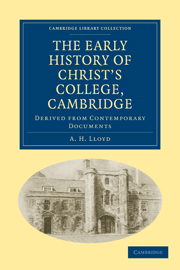Book contents
- Frontmatter
- Preface
- Contents
- LIST OF ILLUSTRATIONS
- List of Abbreviations
- Chronological Summary
- Dedication
- Chapter I William Byngham, the First Founder
- Chapter II The Dispute with John Langton
- Chapter III The First Royal Licence, 1439
- Chapter IV The Expansion of the Milne Street Site
- Chapter V The Royal Licences of 1442
- Chapter VI Marking Time: 1443 to 1446
- Chapter VII The Royal Licence of 1446 and its period
- Chapter VIII The Foundation Charter of the College of Godshouse and its period
- Chapter IX The Relationship of Godshouse and Clare Hall
- Chapter X The Last Days of William Byngham
- Chapter XI The Proctorship of John Hurte, 1451–1458, and of William Fallan, 1458–1464
- Chapter XII The Proctorship of William Basset, 1464–1477
- Chapter XIII The Proctorship of Ralph Barton, 1477–1490
- Chapter XIV The Proctorship of John Syclyng: Early Years, 1490–1496
- Chapter XV The Proctorship of John Syclyng: Later Years, 1496–1506
- Chapter XVI The Negotiations between Godshouse and the Lady Margaret
- Chapter XVII Syclyng's Death and Will
- Chapter XVIII The Buildings and Furniture remaining from the Godshouse period
- Chapter XIX Godshouse and Christ's College
- Appendix
- Index
- Plate section
Chapter IV - The Expansion of the Milne Street Site
Published online by Cambridge University Press: 05 October 2010
- Frontmatter
- Preface
- Contents
- LIST OF ILLUSTRATIONS
- List of Abbreviations
- Chronological Summary
- Dedication
- Chapter I William Byngham, the First Founder
- Chapter II The Dispute with John Langton
- Chapter III The First Royal Licence, 1439
- Chapter IV The Expansion of the Milne Street Site
- Chapter V The Royal Licences of 1442
- Chapter VI Marking Time: 1443 to 1446
- Chapter VII The Royal Licence of 1446 and its period
- Chapter VIII The Foundation Charter of the College of Godshouse and its period
- Chapter IX The Relationship of Godshouse and Clare Hall
- Chapter X The Last Days of William Byngham
- Chapter XI The Proctorship of John Hurte, 1451–1458, and of William Fallan, 1458–1464
- Chapter XII The Proctorship of William Basset, 1464–1477
- Chapter XIII The Proctorship of Ralph Barton, 1477–1490
- Chapter XIV The Proctorship of John Syclyng: Early Years, 1490–1496
- Chapter XV The Proctorship of John Syclyng: Later Years, 1496–1506
- Chapter XVI The Negotiations between Godshouse and the Lady Margaret
- Chapter XVII Syclyng's Death and Will
- Chapter XVIII The Buildings and Furniture remaining from the Godshouse period
- Chapter XIX Godshouse and Christ's College
- Appendix
- Index
- Plate section
Summary
The site occupied by the ‘mansion’, with gardens adjacent, on 13 July 1439 is described by Willis and Clark, vol. i, p. 337; it consisted of Tyled hostel, or St Giles's hostel, leased from the prior and convent of Barnwell, and Cat hostel, bought from Fordeham and Randekyn. The outlook for Godshouse must have improved when Henry VI determined to found his college of St Nicholas, for thereby he gave quietus to the scheme of a college to be founded by the university (if such a scheme had seriously been entertained), and the prominent place held by Langton in the carrying out of the king's plans would serve to dull the edge of his grievance against Byngham. The site of the Old Court of King's was acquired from various owners by Langton and two other commissioners, and was conveyed by them as a whole to the king on 22 January 1441. The negotiations had been conducted with three separate owners and may have occupied many months; we may assume, therefore, that the king's intentions would be known early in the year 1440, if not before; the deed conveying the Trinity Hall part of the king's site is dated 14 September 1440.
The area of the site surrendered by Byngham in 1443 or later, to enable the king to carry out his plans for a larger college, is fixed by the conveyance of a large number of properties by the commissioners to the Provost and scholars of the college of St Mary and St Nicholas in one deed dated 25 July 1446.
- Type
- Chapter
- Information
- The Early History of Christ’s College, CambridgeDerived from Contemporary Documents, pp. 44 - 49Publisher: Cambridge University PressPrint publication year: 2010First published in: 1934



